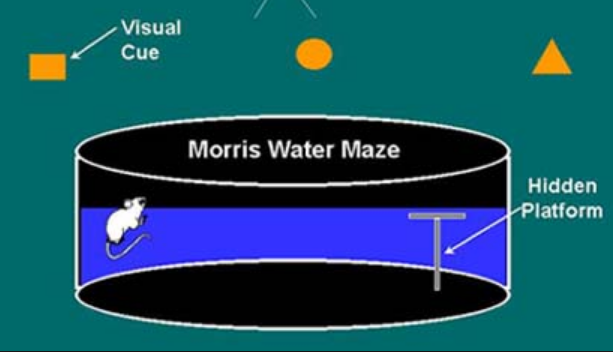Antonova (2011)
 The study by Antonova et al (2011) can be used to address the question of how neurotransmitters play a role in behaviour. The IB accepts cognitive processes as a form of behaviour.
The study by Antonova et al (2011) can be used to address the question of how neurotransmitters play a role in behaviour. The IB accepts cognitive processes as a form of behaviour.
Antonova's research supports Rogers and Kesner's research on the role of acetylcholine in the encoding of spatial memory in rats. The research is one of the first to test the role of acetylcholine in the encoding of cognitive maps in humans.
 The research by Rogers & Kesner (2003) seems to indicate that the acetylcholine plays a key role in the encoding of spatial memory - also known as cognitive mapping.
The research by Rogers & Kesner (2003) seems to indicate that the acetylcholine plays a key role in the encoding of spatial memory - also known as cognitive mapping.
In addition to the research by Rogers and Kesner, researchers have used what is known as the Morris Water Maze [MWM] to test the role of the hippocampus on the creation of spatial memory. In the MWM, the rat is placed in a large circular pool and is required to find an invisible or visible platform that allows it to escape the water by using visual cues.
Piccart and d'Hooge (2008) injected rats with either scopolamine - an acetylcholine inhibitor - or a saline solution which served as a placebo. They found that scopolamine significantly affected the acquisition of spatial memory, with the rats taking longer to find the platform. This difference was the strongest in the first week of training. Once the memories were created, there was no difference between the two conditions - meaning that scopolamine appears to only affect the acquisition of new spatial memories.
However, this research is done using animals. Is this also the case in humans? We know that there is a reduction of acetylcholine receptor sites in Alzheimer's patients - so being able to better understand the actual role of acetylcholine in memory production is important.
An early study was done by Rasmusson and Dudar (1979). Scopolamine was administered orally to volunteers who were required to learn either a series of digits or solve a maze task. Their performance was compared to participants that took a placebo drug. There was no significant difference between the two groups with regard to their ability to recall a series of digits. However, participants in the scopolamine group made more errors and took longer to solve the maze - similar to what we see in the study by Martinez and Kesner.
However, this researcher is quite dated. With our technology today, we can actually measure the activity of different parts of the brain. Antonova (2011) wanted to see if scopolamine affected hippocampal activity in the creation of spatial memory.
The researchers used a sample of twenty healthy male adults, with a mean age of 28 years old. The study used a double-blind procedure and participants were randomly allocated to one of two conditions. They were injected with either Scopolamine or a placebo 70 - 90 minutes before taking part in the experimental task.
The participants were then put into an fMRI where they were scanned while playing the "Arena task." This is a rather complex virtual reality game in which the researchers are observing how well the participants are able to create spatial memories. The goal is for the participants to navigate around an "arena" with the goal of reaching a pole. After they have learned where the pole is located, the screen would go blank for 30 seconds. During this time, the participants were told to actively rehearse how to get to the pole in the arena. When the arena reappeared, the participant was now at a new starting point in the arena. The participants would have to use their spatial memory to determine how to get to the location of the pole.
The participants were first trained in the game to make sure that they were comfortable with the use of the joystick and that they understood the rules of the game. After they were trained, they then took part in the experiment. The participants' brain activity was measured for six trials.
The participants returned between 3 - 4 weeks later and redid the test - receiving the opposite treatment to the original study. In other words, the study was a repeated measures design.
The researchers found that when participants were injected with scopolamine, they demonstrated a significant reduction in the activation of the hippocampus compared to when they received a placebo. It appears that acetylcholine could play a key role in the encoding of spatial memories in humans, as well as in rats.
Although there was a higher rate of error in the scopolamine group, it was not a significant difference. The difference in the activity in the hippocampus, however, is significant. This means that the task as designed may not have been the best for showing performance differences; without the use of the fMRI, there would be no way to know that at the biological level there were significant differences in the two conditions.
The study was a repeated measures design - eliminating the effect of participant variability. In addition, the study was counter-balanced - that is, some of the participants did the scopolamine condition first, and others did the placebo condition first. This controlled for practice effect.
The study was a carried out blindly; this controls for researcher bias.
During the debriefing, several of the participants expressed that they had felt stressed, either as a result of the injection of an unfamiliar drug or being in the fMRI enclosure. This could have an effect on the working of the hippocampus as we know that stress may interfere with memory encoding.
The sample size was small. The results would need to be replicated in order to decide whether the results are reliable.

 IB Docs (2) Team
IB Docs (2) Team
